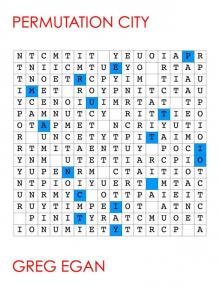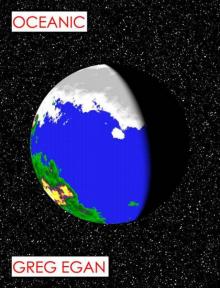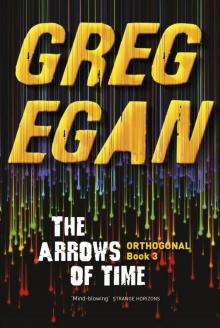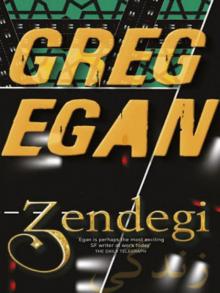- Home
- Egan, Greg
The Arrows of Time: Orthogonal Book Three
The Arrows of Time: Orthogonal Book Three Read online
THE ARROWS OF TIME
Orthogonal Book Three
GREG EGAN
GOLLANCZ
LONDON
Note to Readers
The Arrows of Time is the third volume of a trilogy set in a universe with laws of physics that are very different from our own. The protagonists belong to a species whose biology, history, politics and technology – as revealed in the previous books – bear crucially on everything that follows. Accordingly, anyone approaching this volume is strongly advised to read the preceding volumes first.
Contents
Cover
Title page
Note to Readers
Book Three: The Arrows of Time
1
2
3
4
5
6
7
8
9
10
11
12
13
14
15
16
17
18
19
20
21
22
23
24
25
26
27
28
29
30
31
32
33
34
Appendix 1: Units and measurements
Appendix 2: Light and colours
Afterword
Also by Greg Egan from Gollancz
Copyright
1
From her hilltop post, Valeria swept the telescope’s field of view methodically across the barren plain. The grey rock showed few features in the starlight, but so long as she didn’t rush the task and left no gaps in her search, the kind of change she was looking for would be hard to miss.
She knew she was done when she’d made a full circle around the scope’s mount, bringing her feet back to a patch of rough ground that she could recognise by texture alone. Done and ready to begin again.
Two bells into her shift, Valeria could feel her concentration faltering, but whenever she was tempted to abandon the mind-numbing routine she thought of the incident outside Red Towers. The watcher there had seen a speck of light in the distance, small but growing steadily brighter. His team had reached the fire within a chime or two, and by drawing out its heat into three truckloads of calmstone sand they’d succeeded in extinguishing it. The Hurtler that struck must have been microscopic, the point of ignition shallow, the field of flame relatively small – and some scoffers had gone so far as to insist that there must have been similar strikes before, unobserved and untreated, that had come to nothing. But Valeria was sure that between the spot fires that would fizzle out on their own and the kind of unstoppable conflagration that would simply vaporise everyone in sight, there was room for the watchers to make a difference. If a planet-killer struck, it struck, but it wasn’t futile for people to try their best to fend off disaster for as long as possible.
The clock beside her rang out the last bell before dawn. Valeria gave herself a break, rolling her neck and taking in the view untrammelled by the scope’s restrictions. At the foot of the hill the response team, her co among them, were napping in their sand trucks. Gemma had risen now, bright enough to hide most of the stars, but seven Hurtlers shone in the grey half-light: seven streaks of colour, scattered but parallel, each one displaying perfect mirror-symmetry across its dark centre. These ghostly spikes were lengthening slowly, their violet tips just perceptibly in motion, proof that they hadn’t even been near misses. If a planet-killer was on its way, there’d be no elegant pyrotechnic warning.
But nor would the opposite fate come with portents: if a real solution to the Hurtlers was imminent, the moment of salvation would pass without distinction. If such a feat was possible at all then it was due to be achieved any day now, but there would be no signal from the travellers on the Peerless, no manifestation in the sky, no evidence of any kind.
Still, Valeria took the Hurtlers themselves as proof that the travellers’ first goal was attainable: one object really could possess an infinite velocity relative to another. The history of each Hurtler was orthogonal to her own: the tiny rock’s eons of ancient darkness and its fiery passage through the thin gas between the planets all came and went for her in an instant, with nothing but the time lag for the light to reach her prolonging the spectacle. If the Peerless really had been accelerating steadily for the past year, its engines firing without mishap, its relationship to her would soon be the same as the Hurtlers’. Having entered that state, the travellers could maintain their course for as long as they needed, and whether the need was measured in generations or in eras, from her point of view they would live out their lives in the same blink of her eye, regardless.
Valeria stepped away from the telescope and followed the lines of the Hurtlers to their notional vanishing point. Watching from Zeugma, she’d seen the blaze of flaming sunstone as the mountain sped away in exactly this direction. She held up her thumb, blotting out the point in the sky where the Peerless had been heading – blotting out a line that stretched away from her for an immeasurable distance. At the moment of orthogonality, that line would contain the entire history of the travellers from the day they shut off the engines to the day they had reason to return.
In that instant, Yalda would struggle to give the whole endeavour the best foundations she could; in that instant, her time would come and she’d divide or die. In that instant, generations would follow her who had never seen the home world, and knew they never would. But they’d strive to gain the knowledge that their distant cousins needed, because they’d understand that it was the only way their own descendants could thrive. And in that instant, the journey, however long it had continued, would have to reach some kind of turning point. Hard-won triumph or abject failure, the same moment would encompass it all.
Valeria kept her arm stretched out to the sky, humming softly as she mourned the woman who’d helped raise her. But Yalda would leave behind a powerful legacy. Among her successors in that cloistered mountain, free to spend their lives in unhurried rumination, someone would find a way to spare the world from the Hurtlers.
Valeria was done with asking when. With nothing in the sky to prove her right or wrong, she was free to name the moment when the story of those generations finally unfurled, and the fate of the planet was settled in the blink of an eye, behind her thumb.
Everything that happens, she decided, happens now.
2
‘Let the ancestors burn!’ Pio declaimed. ‘Why should we risk our children’s lives to save those barbarians? We need to stop talking about “the home world” and start looking for ways to make a home for ourselves, right where we are.’
Agata was shocked. She turned to her mother and whispered, ‘Did you know he was planning to go this far?’
‘It’s a debate,’ Cira replied calmly. ‘The speakers should put both sides as strongly as possible; that’s the whole point.’
In the meeting room’s near-weightlessness the audience was spread out in three dimensions, and the hubbub evoked by her brother’s opening statement came at Agata from all directions. It sounded very much as if the people around her had taken Pio’s words to be more than a rhetorical flourish – and, alarmingly, she could hear a few chirps of approval mixed in with the murmurs of disquiet.
Pio waited a few more pauses for the crowd to settle before he continued. ‘People talk about estimating the risks and making some kind of trade-off. People talk about weighing the gross-to-the-fourth living on the home world against our own numbers: less than a gross squared. People do
their best to convince us that it would be an abominable act of selfishness and treason to contemplate sacrificing so many lives for the sake of so few. But to sacrifice ourselves in some misguided attempt to rescue the ancestors would benefit no one. It would simply be the end of the species.’
This bleak conclusion relied on at least two false premises, but Agata restrained herself from offering a running commentary. Pio’s official opponent would soon have a chance to rebut him in front of the whole audience; all Agata could do was irritate her mother and a few hapless bystanders.
‘So what’s the alternative?’ Pio asked. ‘We have the means to go on living in this mountain for at least a dozen more generations – and in that time, surely, we can find a way to make the orthogonal worlds our home.’
An amused voice interjected loudly, ‘How?’
‘I can’t answer that,’ Pio admitted. ‘Perhaps a physicist will find a way to transform our positive luxagens into negative ones, letting us walk safely on the Object before we move on to a larger orthogonal world. Perhaps a biologist will find a way for us to sculpt orthogonal matter into a new generation of children, who bear our traits without being shed directly from our own flesh.’ Agata’s neighbours in the crowd were reacting with equal parts hilarity and incredulity now. ‘Did the ancestors know that we’d learn to make an Eternal Flame?’ Pio persisted. ‘Of course not! They merely trusted that, with time and dedication, we’d solve the fuel problem one way or another. We need to respect our descendants’ abilities to deal with a problem of their own.’
The debate timer rang. Pio flipped the lever to silence and restarted it, then moved back along the guide rope, allowing his opponent to take centre stage.
‘Who knows what our descendants will achieve?’ Lila began. ‘I’m not going to try to refute Pio’s speculations. But it does seem clear to me that any attempt to migrate into orthogonal matter would be perilous – and beyond the danger to the actual pioneers aspiring to set foot on the Object, everyone on the Peerless would be hostage to the need to complete the process in a limited time. Over the generations, as their resources dwindled, they’d be forced to keep wondering whether they needed to cut their losses and try to head home after all. But the longer they put it off, the longer that return journey would be, and eventually any misjudgement of the time they had left would be fatal.
‘Why should we subject our descendants to that kind of torture? We can turn the Peerless around right now, confident that it will support us long enough to complete the trip.’
Lila brought an image onto her chest; the room’s camera picked it up and displayed it on the giant screen behind her. ‘This is the plan,’ she said. ‘This was always the plan, from the day Eusebio broached it with Yalda.’ The sight was enough for Agata to feel a latent impression of the same familiar curve, ready to rise up on her own skin. This was the map of her life’s purpose; she’d understood that since the day she’d first seen it.
‘We know we can make the turn,’ Lila said. ‘All the way around that semicircle, the acceleration we need can be produced with the engines sending photons into the future of either the home cluster or the orthogonal cluster. Only the last stage of the journey presents a problem: it’s not clear how we can begin to decelerate in the approach to the home world. But we’ll have six more generations to address that, and I can’t believe it will prove insurmountable.’
Lila glanced at the timer. ‘To describe this plan as “dangerous” is absurd. Dangerous compared to trying to give birth to children made of negative luxagens? I don’t think so!’
The timer rang. Most of the crowd cheered; Agata ignored her mother’s look of lofty amusement and joined in. Lila deserved the encouragement. Pio’s ideas weren’t likely to get much traction, but with the vote less than a stint away they needed to be refuted decisively for the sake of everyone’s morale.
Pio dragged himself forward again. ‘What dangers would the return pose?’ he asked. ‘Let’s start with a wildly optimistic view, and suppose that the entire journey could be completed safely. Once we reach the home world and deal with the Hurtlers, the barbarians are sure to be grateful – for a while. But could we really live among them, after so much time apart? I can’t see them approving of our ideas about governance, let alone our reproductive methods, and my guess is that they’d hold Starvers in almost as much contempt as Shedders. Then again . . . since we’ve made such a habit of bequeathing tasks to our descendants, maybe the last one could be to devise the kind of weapons they’d need to defend their way of life against the planetary status quo.’
Agata shifted uncomfortably on her rope. She knew he was being sarcastic, but any talk of weapons put her on edge.
Pio said, ‘That’s the optimistic view, but the real problems will arise much sooner. As we decelerate for the turn, we’ll be moving at ever greater speeds with respect to the Hurtlers. For a long time our spin has been enough to fling these specks of dust away, and now we have a fancy system of sensors and coherers guarding the slopes so we can spin-down the mountain with impunity – but even the coherers won’t be able to protect us once the Hurtlers are moving faster than the fastest radiation we can actually detect.’
The audience fidgeted, underwhelmed. Everyone knew that the Peerless was a small target, and though it was true that the mountain’s defences would be useless once the Hurtlers crossed a certain threshold velocity, the period of vulnerability would be brief.
Pio inclined his head slightly, acknowledging the weakness of the point and moving on. ‘Lila assures us that the engines won’t need to violate any thermodynamic laws as we turn the Peerless around. But how certain can we be that they really will keep functioning? And even if the turnaround itself proves uneventful, keep in mind that the entire return journey entails our own arrow of time pointing against the arrow of the orthogonal cluster – a configuration we’ve never experienced before.’
Agata couldn’t contain an exasperated hum. The most dramatic effect she expected from the reversal was for the orthogonal stars to vanish from the sky.
‘Beyond those disturbing uncertainties, no one has the slightest idea how we could commence the final deceleration. Lila herself admits as much!’ Pio paused to let the audience dwell on this – despite his own cheerful confession that he had no idea how a viable migration scheme would work. ‘Imagine what it would mean to be trapped in this mountain, heading back into a region full of ordinary matter but unable to slow down and match speeds with it. Every grain of interstellar dust we encountered would strike us with infinite velocity – rendering it as lethal to us as a Hurtler would be to the ancestors. Astronomers in Yalda’s day searched the sky for years to find the safe corridor we’re moving through now. We should take their gift and make the most of it: we should remain on this trajectory for as long as it’s clear, and use the time to prepare ourselves to step away from all of these colliding worlds and find a home that will be safe for eons to come.’
As Pio reached down to reset the timer there were a few scattered cheers.
Lila took his place. ‘If migrating to the orthogonal worlds would be so much easier than slowing the Peerless for the final approach,’ she said, ‘then let people ponder both questions while we’re travelling back towards the home world. When one problem or the other is actually solved, we’ll be in a position to make an informed choice. What’s more, sticking to the plan and reversing the Peerless would actually make migration easier: all those negative luxagens in the orthogonal worlds will become positive to us! The thermodynamic arrow of the orthogonal stars will be pointing against us, but between coping with that and trying to walk on antimatter, I know which challenge I’d prefer.’
Agata turned to her mother and whispered, ‘The woman just won. It’s over!’ Diehard migrationists might have their reasons to remain committed to the more difficult route, but whatever allure the idea held for wavering voters, Lila had just offered them a vastly less terrifying way to go on thinking about deserting the ancestors, without
burning any bridges until their own safety was guaranteed.
Cira made a non-committal noise.
‘It’s a dangerous cosmos,’ Lila declared. ‘For us, for the ancestors – and for our descendants, whatever choices we make. But thanks to the efforts of the people who launched the Peerless, we’ve had six generations of thought and experiment to ameliorate that danger, and the prospect of six more to come. Pio calls those people barbarians, but what would be barbaric would be turning our backs on them for no other reason than a lack of certainty. If we’re ever confronted with proof that trying to return to the home world would be suicidal, then of course we should change our plans. Until then, why would we not do our best to save the lives of the people to whom we owe our existence? And why would we not all wish our own descendants to be present at that glorious reunion, when the generation who flung a mountain into the sky learn of the extraordinary things we’ve done with the time that they stole for us?’
Agata clung to a rope outside the voting hall, watching the bars of the histogram slowly rising on the news screen beside the entrance.
‘Agata!’ Her friend Medoro approached, the amiable look of recognition on his face giving way to one of amusement. ‘How long have you been here?’
‘A while,’ she admitted. ‘I voted early, and then I thought I’d stay and watch the turnout.’
‘So you’ve been here since the first bell?’
‘I’ve got nothing else to do,’ she said defensively.
‘If I’d known you were holding a vigil, I would have brought you supplies.’
‘Go and vote,’ she suggested, shooing him towards the entrance.
Medoro leant towards her in a conspiratorial pose. ‘How much are you paying?’ he whispered. ‘I took a dozen pieces from your brother’s side, but you still have a chance to buy me back.’
‘That’s not funny.’

 Permutation City
Permutation City Oceanic
Oceanic The Arrows of Time: Orthogonal Book Three
The Arrows of Time: Orthogonal Book Three Zendegi
Zendegi